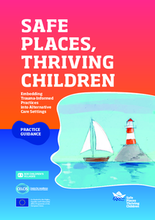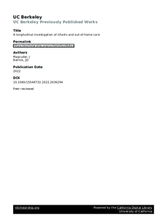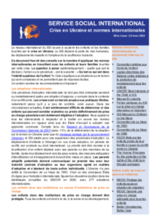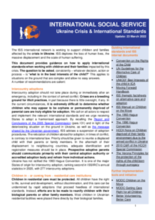Displaying 771 - 780 of 4424
The Practice Guidance was developed by CELCIS and SOS Children’s Villages as a resource for participants taking part in the “Safe Places, Thriving Children” training. The purpose of this guidance is to improve understanding and practice in relation to working with children and young adults who live in alternative care settings and who may have experienced trauma.
This study offers a longitudinal examination of a population-based cohort of infants born in 2001 who entered care during the first year of life and who were followed through multiple care episodes until age 18. Findings suggest that using single, first episode data overstates the proportion of children who successfully reunify and understates the proportion of children who are adopted, return to care, or live with guardians.
Schools in 23 countries, with 405 million pupils, are still partially or fully closed because of Covid, the United Nations Children's Fund says.
Ce document fournit des conseils sur la manière d'appliquer les normes internationales lorsque vous travaillez avec des enfants et leurs familles touchés par cette crise. La question à poser, systématiquement - quelle que soit la décision, l'action ou le processus - est "qu'est-ce qui est dans l'intérêt supérieur de l'enfant?" Cela s'applique à des situations sur le terrain qui sont complexes et ne permettent pas de réponses faciles.
Este documento brinda orientación sobre cómo aplicar los estándares internacionales cuando se trabaja con niños y sus familias afectados por esta crisis. La pregunta que se debe hacer, de manera consistente, sea cual sea la decisión, acción o proceso, es "¿qué es lo mejor para el niño?" Esto se aplica a situaciones sobre el terreno que son complejas y no permiten respuestas fáciles.
This document provides guidance on how to apply international standards when working with children and their families impacted by this crisis. The question to be asked, consistently – whatever decision, action or process – is “what is in the best interests of the child?” This applies to situations on the ground that are complex and allow no easy answers.
This systematic review aims to examine the effectiveness of interventions that seek to improve outcomes of grandchildren raised by grandparents.
This video explains the implementation of the UN Convention on the Rights of Persons with Disabilities in the European Union. The Committee is checking if the EU made progress in the implementation of the UN Convention on the Rights of Persons with Disabilities since 2015. The European Network on on Independent Living (ENIL) submitted a shadow report to the Committee. This video explains what you can find in ENIL's shadow report.
This video explains the implementation of the UN Convention on the Rights of Persons with Disabilities in the European Union. The Committee is checking if the EU made progress in the implementation of the UN Convention on the Rights of Persons with Disabilities since 2015. The European Network on on Independent Living (ENIL) submitted a shadow report to the Committee. This video explains what you can find in ENIL's shadow report.
The seminar is part of a series of seminars organized by The Danish Child Protection Network under the overall theme of child protection through the promotion of transition homes and alternative family- and community-based care.





